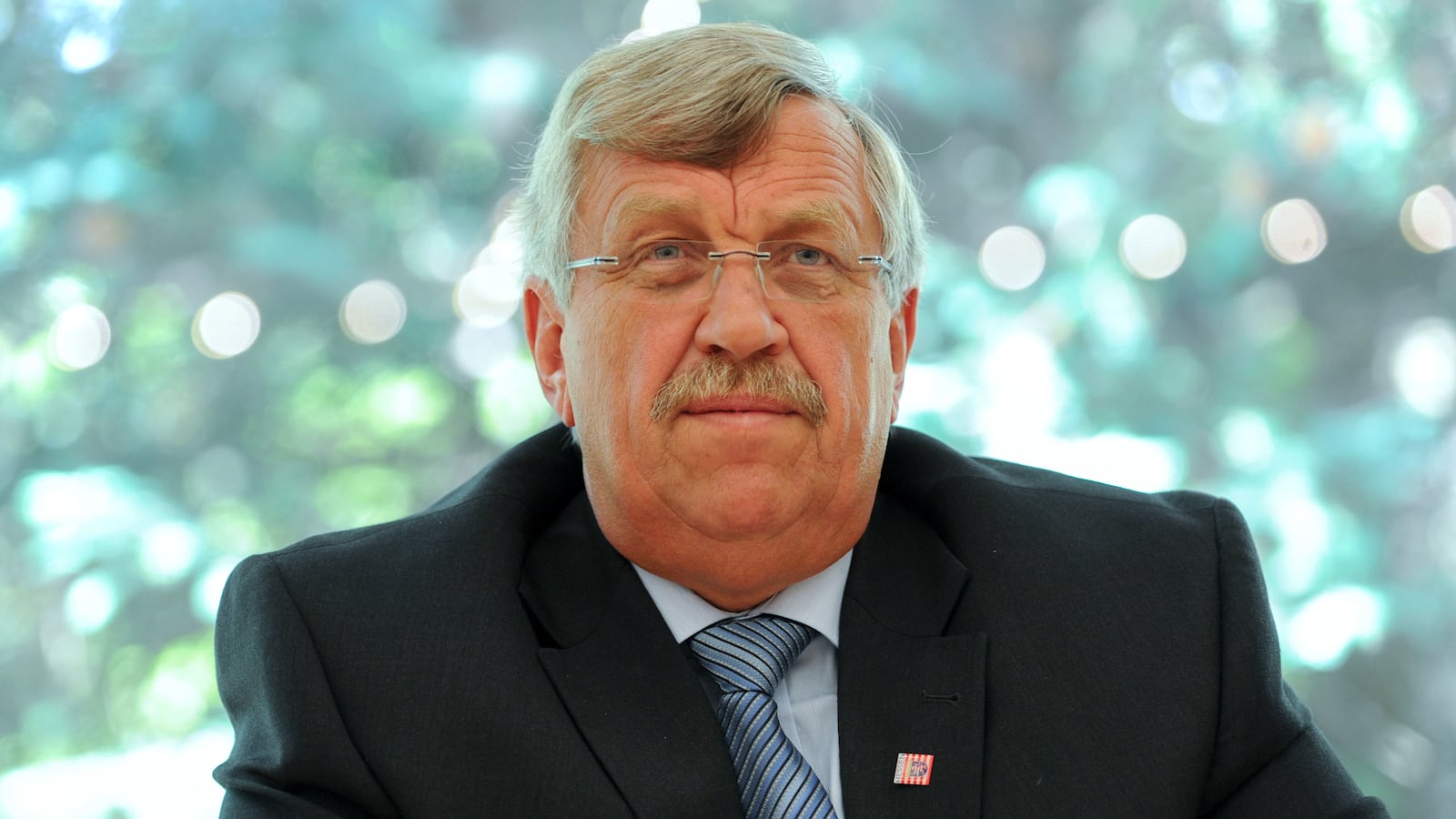BERLIN—On June 2, Walter Lübcke was found dead in his garden with a bullet wound in the head. In his home town of Kassel, in the heart of Germany, the affable 65-year-old politician was a well-known member of Chancellor Angela Merkel’s center right party who had welcomed immigrants when she opened the country’s doors to refugees in 2015—and who had weathered a storm of hatred on social media as a result.
At first, police insisted there was no political connection to the murder, and several investigators dismissed the possibility the killer came from the far right. But this week they arrested a suspect with neo-Nazi associations and a history of racist crimes. Now, the federal prosecutor’s office has taken over the case, which means it will be treated as an act of extremism and, in effect, of terrorism.
Why were the cops so reluctant to make such a connection? Court reporter Annette Ramelsberger noted Tuesday in the German newspaper Süddeutsche Zeitung that extreme right perpetrators “appear to see police not so much as opponents, but as potential allies.” And this is not just their wishful thinking. The far-right riots in Chemnitz last year were notable for neo-Nazis chasing and threatening counter-protesters, while the police, outnumbered, just ran away.
Meanwhile, neo-Nazi circles appeared unimpressed by the federal prosecutor’s last big investigation into the killing spree of an underground neo-Nazi terror cell called the National Socialist Underground that, between 2000 and 2006, murdered nine businessmen from immigrant backgrounds. The investigation was limited to a small group of suspects while cases connected to the terror cell were kept out of court because of “procedurally inefficient grounds.”
The Lübcke murder comes in the wake of what is in many ways an even more disturbing investigation that has raised concerns about the extent to which German law enforcement and the military may be infiltrated by right-wing extremists—and whether this compromises the ability of German authorities to respond appropriately to right-wing terrorism and violence.
That case revolves around a figure known as Franco A., because German law proscribes used of his last name, and his alleged part in a right-wing terrorist group called the Hannibal Network that infiltrated the German army.
His masters thesis at military school was riddled with anti-Semitic conspiracies, but he became a lieutenant in the German army anyway. Next, 30-year-old Franco A. pretended to be a Syrian refugee from Damascus and was granted asylum in Bavaria, but his double life did not last.
After guns, explosives and a “kill list” with the names of left-wing politicians were found in his apartment in 2017, the federal prosecutor became convinced that Franco A. was planning to commit a right-wing terror attack and most likely blame it on refugees.
And it seems that the soldier was not acting alone. Last year, the German newspaper Die Tageszeitung reported that Franco A. had been involved in a nationwide network in which members were preparing for an apocalyptic “Day X” with kill lists and paramilitary exercises. And that the network’s main chat group was administered by an elite special forces soldier, Andre S., who used the codename “Hannibal,” like the lead character in the '80s TV show The A-Team or the Carthaginians who tried to conquer Rome or, perhaps, the serial killer Hannibal Lecter in the movie Silence of the Lambs.
In the past, government ministers have explicitly denied the existence of extreme-right networks in the German army. But now, the Bundestag committee for overseeing intelligence services has gone so far as to order its special representative to investigate the possible existence of such networks.
Usually, Germany’s military counterintelligence service (MAD) is responsible for investigating political extremism in the army. But there are doubts about whether the MAD has done its job well enough. Martina Renner from the far-left Die Linke party tells The Daily Beast that the MAD is “unsuitable for recognizing and fighting extremism in the military.”
“In the history of the extreme right and extreme-right terrorism, the intelligence services have always been part of the problem,” Renner says. Meanwhile, regarding the current investigation that is expected to be finished in 2020, Renner criticizes the fact that the report does not look likely to be made public. Nor will the interior affairs and defense committees be granted access to the files that the report is based on.
Extremists of any stripe may consider a stint in the military useful for weapons training and the potential to steal armaments. And it is not unusual for right-wing extremists with visions of an upcoming “war” between races, religions or cultures to try and recruit members from military circles. In an interview with the Austrian newspaper Profil, the Austrian journalist Julia Ebner pointed out that “very often, traumatized soldiers are a vulnerable target group.”
When investigators first stumbled across Hannibal’s chat groups in 2017, they believed that it was a forum for “preppers”—survivalists who prepare for the collapse of civilization, or at least of the state, when bank machines will stop working, supermarket shelves will be empty, and people will have to fend for themselves. Everyday preppers do things like stock up on canned food and water canisters. They participate in workshops on how to hunt wild boar with a homemade spear.
But when police officers raided the houses of some of these chat group “preppers” in northern Germany, they also found some weapons and lists with the names of left-wing politicians. By now, it is known that the chat groups’ members included soldiers and intelligence agency bureaucrats as well as professional extreme-right actors and Franco A. They talked about the “Überfremdung” (over-foreignization) of Germany. They discussed how, in the case of a state collapse, members of the network would put on their uniforms, round up their targets and shoot them.
Right-wing extremists rely on conspiracies of inevitable doomsday scenarios to explain their actions and to recruit more people. The Christchurch terrorist, who appeared to believe in a future civilizational clash which the fascists would win, tweeted two 2017 Deutsche Welle articles about the potential extreme-right infiltration of the German army a few days before his attack in New Zealand.
Andre S. (Hannibal) has views that echo the white extinction conspiracy that the Christchurch shooter propagated: when officials went to his barracks in 2017 to question him, he told them that “Islam will be the No. 1 state religion in the Netherlands in 10 years time.” Around 4 percent of the country’s population practices Islam. (Last year, a Czech neo-Nazi called Zdeněk Chytra, who works for the think tank of the German AfD’s deputy leader Beatrix von Storch, told me that climate change and migration to Europe would lead to “the kind of civil war that you can only dream about.”)
In the case of the Hannibal network, Renner draws parallels to the Technischer Dienst, which was the paramilitary arm of the Bund Deutscher Jugend, an anti-communist group in early postwar Germany that was initially funded by U.S. intelligence services, who wanted to train guerrilla fighters in the event of a war with the Soviet Union. The Technischer Dienst recruited former soldiers from the Wehrmacht and the Waffen-SS, hoarded weapons and kept “black lists” of political opponents to be “neutralized” on “Day X.”
For Germany’s intelligence agencies, one of the biggest postwar failures was to overlook the existence of the National Socialist Underground for seven years, during which the terrorists murdered 10 people altogether: the men from immigrant backgrounds and a policewoman. After the terror cell was discovered in 2007, it was revealed that the agencies had indirectly helped fund it, via their use of neo-Nazis as paid informants.
Since then, there have been reforms. Germany’s federal public prosecutor, Peter Frank, announced that state prosecutors should pass over to him any case that involves right-wing terrorism. But in a recent interview, Frank said that his office has not found anything “legally relevant” to use against Andre S.’s doomsday network.
So Andre S. is still in the German army today.
When police came to his place in 2017, he was ready for them. According to the German newspaper Süddeutsche Zeitung, two comrades later testified that Andre S. had hidden a laptop with risky data. Earlier this year, a man whose job it is to investigate political extremism for the MAD was charged and acquitted with warning Andre S. about the raid in advance.
When Andre S. appeared in court to testify in that man’s case, he wore a tie with the symbol for an organisation called Uniter, where he is the deputy chairman. “Uniter” claims to help former elite soldiers and police officers find work after their service. Earlier this year, for example, a Uniter representative flew over to Manila to pitch the organisation’s training program to Filipino military and police officers loyal to the murderous government of President Rodrigo Duterte. In the group picture, the Uniter man has his arm raised Duterte-style with a closed fist.
Meanwhile, the terrorism charges against Franco A. have been dismissed as well. Despite the weapons and kill lists, prosecutors could not show that he was planning to see any of it through. In the case of Franco A., his lawyer argued that the young man was just going undercover to find out about Germany’s refugee policies. He cited Franco A.’s student job at McDonald's as evidence of the soldier’s early interest in the low wage sector and general enthusiasm for investigative projects.
That both the German army and the military intelligence service are led by the Ministry of Defense is “practically inefficient,” according to Martina Renner from Die Linke. Moreover, Renner describes the MAD’s criteria for judging soldiers as right wing extremist as “dubious.” She says, “The actual figures are presumably higher.”
To judge any soldier as a “right wing extremist,” the MAD requires proof that he or she has a “closed, extreme right worldview.” But it seems strange to demand coherence when right-wing terrorists, in practice, are already mixing different aspects of far right ideas and stereotypes.
In an interview with the Swiss newspaper Neue Zürcher Zeitung this year, Franco A. claimed he had gotten lost in his own head when he wrote his extreme-right conspiracy-riddled master’s thesis at military school. Back then, the academy just told him to write a new essay.
Currently, Franco A. is on leave from the Germany army, though he may be allowed back.








